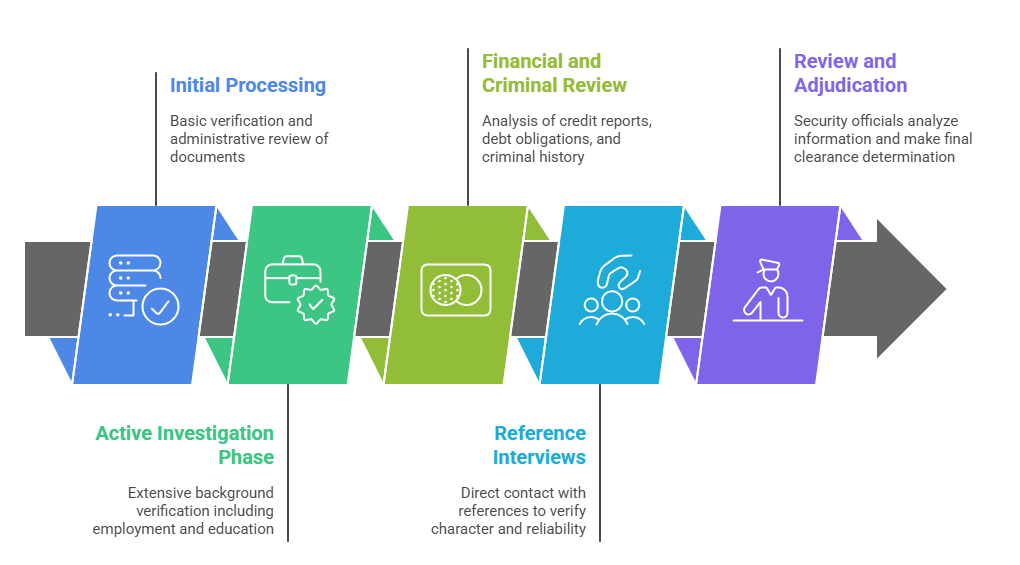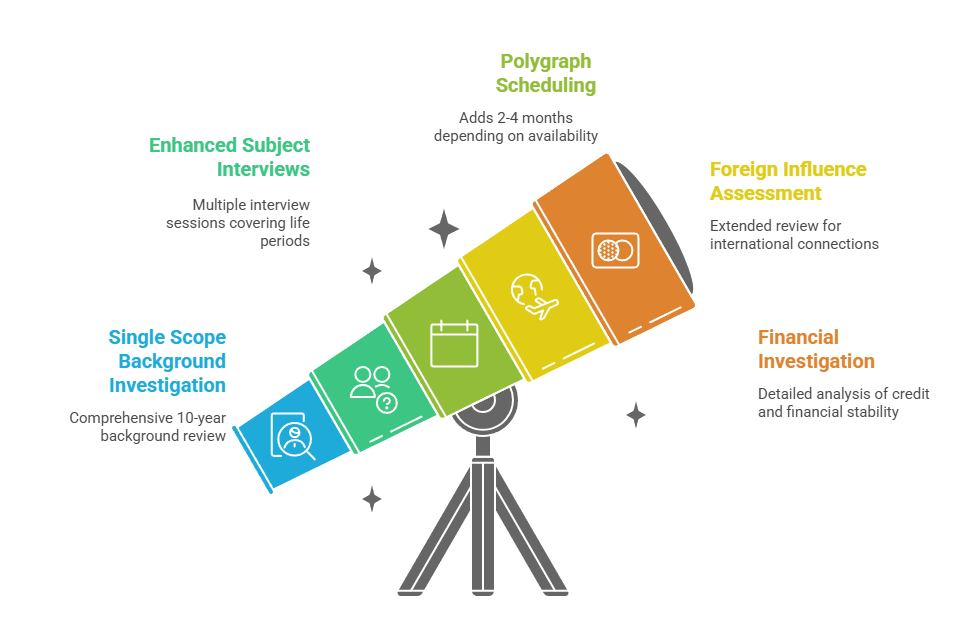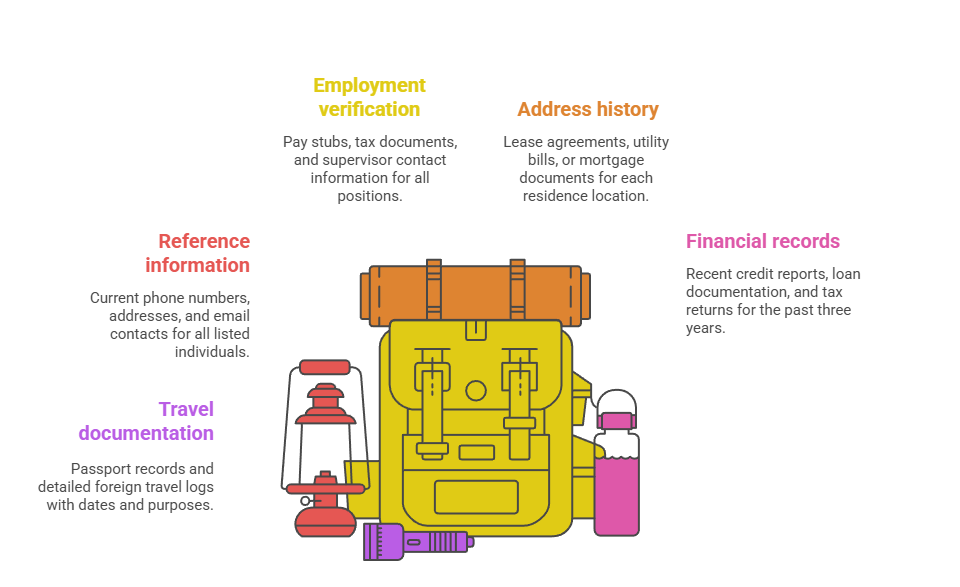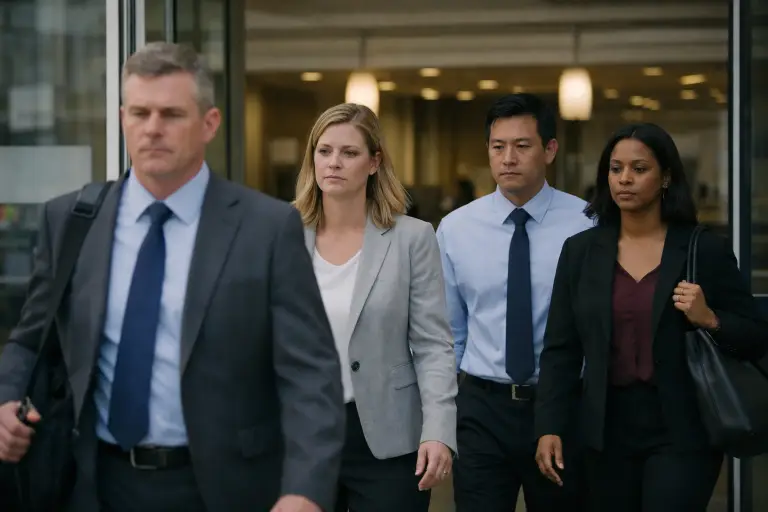DoD contractor background checks typically take 4-18 months to complete in 2025, with Secret clearances averaging 6-8 months and Top Secret clearances requiring 12-18 months. The timeline depends on your clearance level, personal history complexity, and current government processing backlogs.
Key Takeaways
- Secret clearance investigations generally take 4-8 months, while Top Secret clearances require 8-18 months for completion.
- Interim clearances can be granted within 30-90 days, allowing you to start work while your full investigation continues.
- Personal factors like foreign contacts, financial issues, or frequent relocations can extend your DoD background check timeline significantly.
- Government processing backlogs in 2025 continue to impact timelines, with some cases experiencing delays beyond standard timeframes.
- Complete and accurate paperwork submission can reduce processing time by 2-4 weeks compared to applications requiring corrections.
- Active communication with investigators and prompt response to requests helps maintain momentum throughout the screening process.
Understanding DoD Background Check Timelines
The Department of Defense contractor background check process varies significantly based on clearance level and individual circumstances. In 2025, the Defense Counterintelligence and Security Agency (DCSA) handled most DoD contractor screenings, processing over 700,000 investigations annually. The agency has streamlined many procedures since the pandemic, yet complex cases still require extensive manual review.
Current defense contractor background check time reflects ongoing efforts to reduce historical backlogs while maintaining thorough security standards. However, increased threats to national security have also made investigators more cautious. This balance between speed and thoroughness directly impacts how long DoD background check processing takes for each candidate.
Processing times have improved compared to peak delay periods in 2018-2020, when some Top Secret clearances took over 24 months. Today's streamlined approach focuses on risk-based investigations and continuous monitoring to accelerate initial clearance decisions. Additionally, artificial intelligence now handles routine checks that previously required human review.
Secret Clearance Timeline Breakdown
Secret clearance investigations for DoD contractors typically require 4-8 months to complete in 2025, with most straightforward cases finishing within six months when candidates maintain clean backgrounds and submit complete documentation. The timeline begins immediately after your employer submits your SF-86 form and fingerprints to DCSA (Defense Counterintelligence and Security Agency) systems, initiating a comprehensive review process that examines seven years of your personal and professional history.
Secret Clearance Investigation Process:

- Initial Processing (Weeks 1-4): Basic verification checks and administrative review of submitted SF-86 documentation
- Active Investigation Phase (Months 2-5): Extensive background verification including employment history, residence confirmation, education records, and reference interviews
- Financial and Criminal Review: Comprehensive analysis of credit reports, debt obligations, criminal history, and any foreign national connections
- Reference Interviews: Direct contact with listed personal and professional references to verify character and reliability
- Review and Adjudication (Months 5-8): Security officials analyze all collected information and make final clearance determination based on national security guidelines
Understanding this timeline helps DoD contractor candidates prepare appropriately and maintain realistic expectations throughout the security clearance process. While delays can occur due to incomplete information, foreign travel, or complex personal circumstances, most Secret clearance applications with thorough documentation and cooperative candidates reach successful completion within the standard timeframe, enabling contractors to begin their classified work assignments.
Expedited Secret Clearance Cases
Some Secret clearance applications receive expedited processing due to urgent mission needs or prior clearance history. These cases may complete in 90-120 days when applicants have recent investigations and minimal background changes. However, expedited processing remains limited to specific circumstances determined by government priorities.
Candidates with expired clearances often benefit from faster processing than first-time applicants. Previous investigations provide baseline information that investigators can update rather than completely reconstruct. This advantage typically reduces processing time by 4-8 weeks compared to initial clearance seekers.
Top Secret Clearance Processing Duration
Top Secret clearances require more extensive investigations, typically taking 8-18 months for DoD contractor positions. The enhanced scrutiny reflects the sensitive nature of information you'll access in these roles. Moreover, investigators conduct deeper background reviews and require more comprehensive documentation than Secret clearance investigations.
The investigation covers ten years of your background history and includes intensive interviews with personal references. DCSA investigators often conduct face-to-face meetings with multiple contacts from different periods of your life. They also perform detailed financial reviews and may require polygraph examinations for certain positions. Furthermore, any foreign connections receive extensive scrutiny that can add months to the process.
Defense contractor background check timelines for Top Secret positions involve several specialized phases:

- Single Scope Background Investigation (SSBI): Comprehensive 10-year background review requiring extensive documentation
- Enhanced subject interviews: Multiple interview sessions covering different life periods and potential security concerns
- Polygraph scheduling: Adds 2-4 months depending on examiner availability and geographic location
- Foreign influence assessment: Extended review process for international connections, travel, or dual citizenship
- Financial investigation: Detailed analysis of credit, debts, financial stability, and potential vulnerabilities
These comprehensive reviews ensure candidates can safely access highly classified information. Consequently, the DoD screening process duration for Top Secret clearances rarely falls below eight months, even for ideal candidates.
TS/SCI Additional Requirements
TS/SCI clearances involve additional screening beyond standard Top Secret requirements. The compartmentalized information access requires specialized background investigations and ongoing monitoring protocols. These positions often involve the most sensitive national security information, necessitating even more thorough vetting.
Candidates undergo psychological evaluations and enhanced lifestyle polygraph examinations during this process. These additional steps can extend processing times by 4-8 months beyond standard Top Secret timelines. Total processing time reaches 12-24 months in complex cases involving extensive foreign travel or complicated financial situations.
Personal Factors Affecting Processing Speed
Several personal and procedural factors significantly impact how long your DoD background check takes to complete. Clean financial history, stable employment records, and limited relocations typically accelerate processing. Conversely, foreign contacts, financial problems, or incomplete documentation can extend timelines considerably.
Your background complexity directly correlates with investigation duration. Simple cases with straightforward histories process faster than complex situations requiring additional verification. Understanding these variables helps set realistic expectations and identify potential delay sources early in the process.
| Accelerating Factor | Time Savings | Impact Level |
| Complete accurate paperwork | 2-4 weeks | High |
| Stable employment history | 1-3 weeks | Medium |
| Clean financial record | 2-6 weeks | High |
Delaying factors require additional investigation time and resources. Foreign contacts need extensive verification through multiple agencies and international sources. Financial issues trigger enhanced scrutiny of your judgment and potential vulnerability to coercion. Employment gaps require detailed explanations and additional reference interviews.
The most significant delays occur when investigators cannot locate references or when subjects have extensive international connections. Multiple foreign countries, frequent international travel, or close foreign relationships can double standard processing times. Additionally, incomplete or inaccurate initial paperwork typically adds 4-8 weeks while corrections are processed.
Interim Clearance Opportunities and Limitations
Interim clearances provide a pathway to begin DoD contractor work while your full background investigation continues. These temporary approvals typically process within 30-90 days of application submission. However, not all positions qualify for interim clearances, particularly those requiring access to highly sensitive information.
DCSA grants interim clearances based on initial automated checks and preliminary reviews of your SF-86 information. The process includes database searches for criminal records, credit issues, and basic identity verification. Most contractors with clean backgrounds and complete paperwork receive interim approval within 60 days of submission.
Interim approval rates vary significantly by clearance level and background complexity:

- Secret interim approvals: Granted in approximately 70% of eligible cases with clean initial screenings
- Top Secret interim approvals: Limited to 40-50% of applications due to enhanced security requirements
- Previous clearance holders: Experience 80-90% interim approval rates when applying for same or lower levels
- First-time applicants: Face stricter interim criteria with 50-60% approval rates for Secret level positions
Access restrictions apply to all interim clearances until final determinations are complete. You may face limitations on specific projects, information types, or work locations. Additionally, interim clearances can be revoked immediately if investigations reveal disqualifying information.
Interim Clearance Best Practices
Maximizing your interim clearance chances requires careful preparation and honest disclosure. Complete all SF-86 sections thoroughly and disclose any potentially problematic background elements upfront. Investigators view honesty favorably, while omissions or false statements typically result in immediate interim denial.
Financial stability plays a crucial role in interim clearance decisions. Outstanding debts, recent bankruptcies, or tax liens often disqualify candidates from interim approval. Therefore, addressing financial issues before applying significantly improves your chances of receiving interim clearance.
2025 System Improvements and Current Challenges
The DoD background check system continues evolving in 2025, with new technologies and procedures affecting processing timelines. DCSA has implemented artificial intelligence tools to streamline initial application reviews and flag potential issues earlier in the process. These improvements have reduced initial processing delays by approximately 15-20% since 2023.
Digital transformation initiatives have modernized many previously manual processes. Online submission systems, electronic verification methods, and automated reference checking accelerate early investigation phases. However, core investigative work still requires human investigators and face-to-face interviews, maintaining inherent timeline limitations.
Current system enhancements include several technological improvements:
- Automated reference verification: Digital systems contact references faster and track response rates more effectively
- Enhanced database integration: Real-time access to multiple government databases reduces verification delays
- Risk-based investigation models: Algorithm-driven prioritization focuses resources on higher-risk cases requiring immediate attention
- Mobile investigator tools: Tablet-based systems allow faster report submission and case updates from field locations
Despite these improvements, certain bottlenecks persist throughout 2025. Investigator availability remains a limiting factor, particularly in geographic areas with high contractor populations. Interview scheduling delays and reference availability continue impacting overall timelines across all clearance levels.
Regional Processing Variations
Processing times vary significantly by geographic region due to investigator availability and local case volumes. Areas with high defense contractor concentrations like Northern Virginia, Southern California, and Colorado Springs experience longer delays due to high demand.
Rural locations may face extended timelines due to limited investigator presence requiring travel time for interviews. However, some remote areas with fewer total cases may actually process faster once investigators are assigned to specific regions.
Strategies for Minimizing DoD Background Check Duration
While you cannot directly control government processing speed, several strategies help optimize your background check timeline. Proactive preparation and responsive communication significantly impact overall processing duration. Most importantly, complete and accurate initial submissions prevent common delays caused by paperwork corrections.
Pre-submission preparation involves gathering comprehensive documentation before starting your SF-86 form. Collect employment records, address histories, reference contact information, and financial documentation early in the process. Verify that all references are reachable and willing to participate in investigator interviews when contacted.
Documentation preparation checklist includes essential items that expedite processing:

- Employment verification: Pay stubs, tax documents, and supervisor contact information for all positions
- Address history: Lease agreements, utility bills, or mortgage documents for each residence location
- Reference information: Current phone numbers, addresses, and email contacts for all listed individuals
- Financial records: Recent credit reports, loan documentation, and tax returns for the past three years
- Travel documentation: Passport records and detailed foreign travel logs with dates and purposes
Maintaining updated contact information throughout the process ensures investigators can reach you without delays. Additionally, prompt responses to investigator requests maintain processing momentum and prevent unnecessary timeline extensions.
Common Timeline Disruptors and How to Avoid Them
Certain background elements consistently cause processing delays across all clearance levels. Criminal history, even minor infractions, requires additional documentation and review time that can extend investigations by several weeks. Financial problems like tax liens, defaulted loans, or bankruptcy proceedings require extensive documentation and may involve interviews with creditors.
Drug use disclosures trigger enhanced screening protocols, particularly for recent usage within the past year. However, honest disclosure typically results in better outcomes than attempted concealment. Investigators appreciate transparency and often work with candidates who demonstrate rehabilitation and lifestyle changes.
The most problematic delays result from incomplete or inaccurate initial submissions. Missing information requires investigators to pause active cases while waiting for corrections or additional documentation. These interruptions can add 2-8 weeks to processing timelines and sometimes require restarting certain investigation phases.
| Common Delay Source | Average Extension | Prevention Strategy |
| Incomplete SF-86 form | 2-4 weeks | Professional review before submission |
| Unreachable references | 3-6 weeks | Verify contact information in advance |
| Missing documentation | 1-3 weeks | Gather all records before applying |
Foreign connections represent another significant delay source requiring careful management. Extensive international travel, foreign business interests, or close relationships with non-U.S. citizens trigger additional investigation requirements. While these factors don't automatically disqualify candidates, they substantially extend processing timelines.
Reference Management Best Practices
Your listed references play a crucial role in investigation speed and success. Choose individuals who know you well and can provide detailed information about your character and activities. Additionally, prepare references for investigator contact by explaining the process and timeline expectations.
Reference selection should include diverse perspectives from different life periods and contexts. Professional supervisors, personal friends, neighbors, and academic contacts provide comprehensive views of your background. However, avoid listing references who may be difficult to contact or unwilling to participate fully in the interview process.
Monitoring Your Application Progress

Staying informed about your clearance progress helps identify potential issues early and maintain realistic timeline expectations. The DCSA online portal provides periodic status updates, though detailed information remains limited for security reasons. Most candidates receive updates every 30-60 days during active processing periods.
Your facility security officer (FSO) serves as your primary point of contact throughout the clearance process. Regular communication with your FSO helps track progress and address any emerging issues promptly. Many contractors find that maintaining engagement, rather than waiting passively, helps prevent unnecessary processing delays.
Effective progress monitoring involves several key activities. First, maintain current contact information with both DCSA and your employer throughout the process. Second, respond promptly to any requests for additional information or clarification. Third, report any significant life changes like address moves, employment changes, or foreign travel immediately.
Status check frequency should balance staying informed with avoiding excessive inquiries that burden processing staff. Monthly contact with your FSO typically provides adequate updates without creating unnecessary administrative burden. Additionally, understanding that processing involves multiple agencies helps explain why detailed status information may be limited.
Alternative Career Paths During Processing
The lengthy DoD screening process duration often requires candidates to consider alternative employment options while waiting for clearance decisions. Many defense contractors offer non-cleared positions that provide relevant experience and demonstrate commitment to the industry. These interim opportunities can strengthen your qualifications and improve long-term career prospects.
Contract staffing agencies frequently maintain relationships with multiple defense contractors and can help identify temporary positions suitable for clearance candidates. Additionally, some government agencies offer student programs or internships that don't require security clearances but provide valuable experience and networking opportunities.
Professional development during clearance processing helps maintain career momentum and demonstrates continued commitment to the field. Industry certifications, relevant training programs, and educational advancement show employers your dedication while waiting for clearance approval. Furthermore, networking within the defense contractor community often leads to better position opportunities once your clearance is granted.
Conclusion
DoD contractor background check timelines in 2025 range from 4-18 months depending on clearance level and individual circumstances. Secret clearances typically complete within 6-8 months, while Top Secret investigations require 12-18 months on average. Interim clearances offer opportunities to begin work within 30-90 days for qualified candidates, though access limitations apply until full clearances are granted. Thorough preparation, complete documentation, and responsive communication with investigators help optimize your processing timeline and improve approval chances.
Frequently Asked Questions
Can I check the status of my DoD background check online?
Yes, you can check your clearance status through the DCSA online portal or by contacting your facility security officer (FSO). Updates typically appear every 30-60 days during active processing, though detailed information remains limited for security reasons.
What happens if my DoD background check is denied?
Clearance denials include detailed explanations and appeal rights through the Defense Office of Hearings and Appeals (DOHA). You can address the issues cited and reapply after a waiting period, typically 12 months for most denial reasons, though some issues may require longer waiting periods.
Do previous military clearances speed up DoD contractor background checks?
Active military clearances can transfer to contractor positions without reinvestigation if they're current and at the appropriate level. Expired clearances may still reduce processing time by 4-8 weeks compared to first-time applications, as previous investigations provide baseline information for updates.
How long are DoD contractor clearances valid once granted?
Secret clearances require reinvestigation every 10 years, while Top Secret clearances need renewal every 5 years. Continuous evaluation monitoring occurs throughout the clearance period, and certain life changes may trigger earlier reinvestigations regardless of normal renewal schedules.
Can I travel internationally while my DoD background check is being processed?
International travel is permitted but must be reported to your FSO immediately upon return. Extensive foreign travel or contacts discovered during processing may extend your investigation timeline by 2-6 months, particularly if you visit countries of security concern.
What's the difference between DoD and other federal agency background checks?
DoD clearances are generally transferable across federal agencies, though some agencies have additional requirements like polygraph examinations or specialized training. The basic investigation standards remain consistent across the federal government, but processing times may vary by agency workload.
Can financial problems automatically disqualify me from getting a DoD clearance?
Financial problems don't automatically disqualify candidates, but they trigger enhanced scrutiny of your judgment and potential vulnerability to coercion. Recent bankruptcies, significant unpaid debts, or tax liens require detailed explanations and may extend processing times by 1-4 months while investigators review your financial stability.
How do investigators verify information during the background check process?
Investigators use multiple verification methods including database searches, employer contacts, neighbor interviews, and document reviews. They conduct face-to-face interviews with references, verify employment through HR departments, and cross-reference information from multiple sources to ensure accuracy and identify any discrepancies.
Additional Resources
- Defense Counterintelligence and Security Agency (DCSA) Official Website
https://www.dcsa.mil/ - Security Clearance Processing Times - Current Statistics
https://www.dcsa.mil/mc/pv/mbi/ - SF-86 Form Instructions and Completion Guide
https://www.opm.gov/forms/pdf_fill/sf86.pdf - Federal Investigative Standards - Background Check Requirements
https://www.dni.gov/files/NCSC/documents/regulations/SEAD-4-Adjudicative-Guidelines-U.pdf - Continuous Evaluation Program Overview
https://www.dcsa.mil/mc/ctp/ce/ - Security Clearance Appeal Process Guide
https://www.doha.mil/procedures/ - Interim Clearance Policy and Procedures
https://www.dcsa.mil/portals/91/documents/pv/mbi/Interim-Clearance-Guide.pdf

GCheck Editorial Team
Meet the GCheck Editorial Team, your trusted source for insightful and up-to-date information in the world of employment background checks. Committed to delivering the latest trends, best practices, and industry insights, our team is dedicated to keeping you informed.
With a passion for ensuring accuracy, compliance, and efficiency in background screening, we are your go-to experts in the field. Stay tuned for our comprehensive articles, guides, and analysis, designed to empower businesses and individuals with the knowledge they need to make informed decisions.
At GCheck, we're here to guide you through the complexities of background checks, every step of the way.





